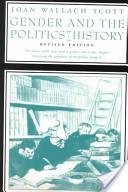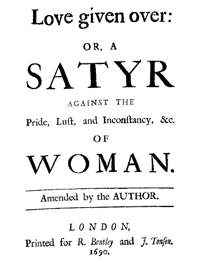M A T E R I A L S
I hope you will ask some questions of your own and we can post them here.
What is confusing? What do you wonder about?
Juvenal: c. 55-c. 127
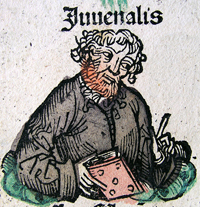
Woodcut of Juvenal from the Nuremberg Chronicle (late 1400s)
Some dates that will be helpful in thinking about Juvenal's time and the past he looks back to
753-509 BCE Regal period
509-264 BCE Early Republic
264-133 BCE Middle Republic
Punic Wars
133-31 BCE Late Republic
133-121 BCE Reform-Gracchi
121-91 BCE Republlic
91-80 BCE Wars and Dictatorship
79-60 BCE
59-44 BCE Final collapse of Roman Republic
Triumvirate
31 BCE-193 CE Early Roman Empire
193-235 CE Later Roman Empire
Juvenal approx. 55-140 CE
Augustus 31BCE-14CE
Tiberius 14-37 CE
Gaius (Caligula) 37-41 CE
Claudius 41-54
Nero 54-68
The Year of the 4 emperors
Vespasian 69-79
Titus 79-81
Domitian 81-96
Nerva 96-98
Trajan 98-117
Hadrian 117-138
NB: There are explanatory notes beginning on pp.151-2. They should be a help.
1. Satire comes from "satura," in fact, satura lanx--a mixed platter. Satires may seem like a buffet of abuse, ridicule, criticism. There is often little "narrative" coherence. The poem often features a list or catalogue with only slight links between sections. It may be a gallery of examples.
Do you see any particular organizing principle?
2. Juvenal's poem is an example of what is called Formal verse satire. It is spoken by a single speaker, interrupted only briefly by a satiric adversary posing questions to test the thesis; the case is then reconfirmed. Sometimes a praise section ends the poem, but not always.
Do you have anything to say (any generalization) about the speaker? Is he angry? Does he draw the reader into his "ethos"?
3. What basic question governs the poem? Why does that question turn out to be an ideal framework for a satire against women?
4. Opening lines:
---What words do you notice? What contrast emerges? What do you make of the contrast?
---Nature vs artifice: Which is more attractive?
---What is culture identified with?
---What does Juvenal's golden age look like?
---Who is Saturn? What do you make of Juvenal's use of Golden, Silver, & Iron ages?
5. Lines 21-2:
---Who else leaves the earth when Chastity leaves? "Two sisters together, beating a common retreat." What do you think about this alignment?
6. Lines 23 ff.: Address to Posthumus "my friend"
---Why is "an ancient and long-/Established tradition" ironic?
---
What is the first crime?
---Marrying is the least attractive way to do what?
---What is the alternative to marriage and why is it better?
---What is the Family Encouragement Act?
---Ursidius seeks a girl with antique morals: What does he want? What chance is there that he will find such a wife?
Joan Scott, "Preface to the Revised Edition" & "Some More Reflections on Gender and Politics"
Discussion of the Scott material is important in itself and important as it gives you practice for your annotated bibliography.
"Preface"
1. What central point does Scott make in her preface? Does it surprise you?
2. Why are words like "provocation" and "disrupt" important to her thinking?
3. What does "gender" mean when you use it? What would it mean for you to "keep renewing [your] analytic vocabulary" (xiii)?
"Some More Reflections on Gender and Politics"
1. "Sex" and "gender" are both concepts. So what? In what ways does Scott suggest that we fall in to the mistake of thinking of sex as natural ("pre-linguistic, ahistorical") (200)?
2. What does Scott say Gayle Rubin says? (202). Would you consider using the Gayle Rubin article for your annotated bibliography?
3. What do you think of the idea that " sexual identity" is not stable, that it is "secured only through its repeated performance" (203)?
4. Why do you think sexual identity has such psychic weight?
5. Scott quotes Freud: "Nature has, as a precaution, attached [great importance] to that particular organ" (204). What do you think? What is this nature?
6. Look at Scott's "I would argue, then" statement on p. 205. Paraphrase it.
7. "What is at stake in attempts to enforce boundaries between the sexes?" (206) What do you think? Could you make this question important to you reading of Juvenal?
8. Does the presence of women always call for gender analysis?
9. As or "rights" talk, how important is it that women have equal rights?
10. Ask some of your own questions.
Church Fathers
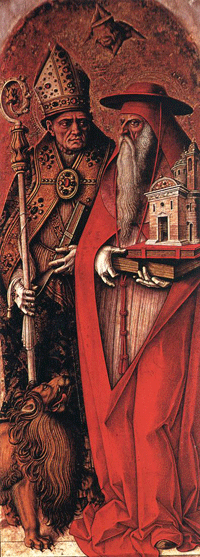
Saints Jerome and Augustine -
part of a triptch by Carlo
CRIVELLI, c. 1490
1. What does "ascetic" mean. What is the meaning of the Greek word it comes from?
2. What seems to be at stake in becoming an "object of desire"? What's the problem? In what framework does it make sense to make every effort to avoid becoming an object of desire?
3. Trace the uses of chastity in Tertullian and other writers. What is "true chastity"? What can you say about a statement like "For where God is, there is chastity" (55)?
4. Tertullian says, "Whatever is born is the work of God. Therefore, what is contrived later is the business of the devil" (53). Could his 2 categories be translated into categories we've been discussing?
5. Why, according to John Chrysostom, must women be silent in church?
6. Paraphrase Ambrose's conclusion from the example of Deborah. Compare with his treatment of the Marys.
7. What does "weakness of the sex" mean? or "weaker vessel"?
8. Summarize Jerome's reasoning in paragraphs 1, 2, & 3. This summary will take effort and care. (It's worth paying very close attention to the "Against Jovinian" material. We will see it again soon in a very different context.)
9. Compare Jerome to Juvenal.
10. What's the problem with second marriages?
11. Why do men marry?
12. Paraphrase the 2 letters by Jerome.
13. Paraphrase the sections from Augustine.
"The Wife of Bath"
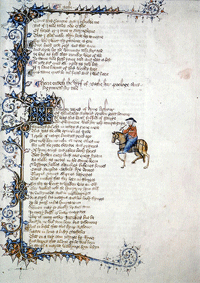
Opening page of The Wife of Bath's
Prologue Tale, from the Ellesmere
manuscript of Geoffrey Chaucer's
Canterbury Tales.( Huntington Library).
See Luminarium page.
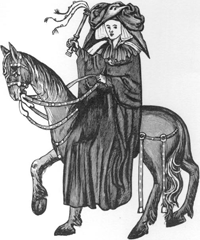
Chaucer Society woodcut
of The Wife of Bath, Based on
MS Cambridge Gg.4.27
Christine de Pizan
Chaucer,"The Wife of Bath"
1. Do you think Chaucer's work can be considered a feminist text? Why or why not? Does re-contextualization of anti-feminist texts compromise the anti-feminist tradition? Or does this prologue simply provide a new framework to showcase that tradition? How do you think it adds up? (Does this question make sense to you?)
2. What do you make of the fact that the Prologue features other texts? What is implied by that incorporation of texts?
3. How can you compare the Prologue with Juvenal and Jerome. Would the Wife of Bath fit as an example in Juvenal's poem or Jerome's essay? If she would be an example with a difference, what is the difference?
4. Specifically, how does the Wife use Paul, Theophrastus, and Jerome on Jovinian? Do you think Chaucer gives her the skill and knowledge implied by the use of these authors, or does the prologue merely demonstrate Chaucer's skill and knowledge?
5. How does the contrast between experience and the authority underlie the development of the prologue? How many times in her prologue does she call on the superiority of experience over authority?6. Does Wife's prologue encourage you to use gender as a category of analysis?
7. What is the quarrel between women and books? (See pages 218-19.)
8. Could you make an argument that being chaste is a little like hoarding (see p. 208 & p. 211)?
9. What is the importance of interpretation in the prologue?
10. What problem(s) does the Prologue articulate? What answers does it provide?
Christine de Pizan
1. The editorial material on p. 223 (not a part of your assigned reading) says, "Some passages from the Church Fathers in chapter 2 might have warranted inclusion in ['Responses to Antifeminism']." The examples include Jerome 9-11, 25, and 26 "on loyal wives, on the Virgin, and on men's sexual hypocrisy; Augustine 7-9 on women at doomsday; and Ambrose I on Deborah" (222). What do you think? And what about the Wife of Bath?
2. How does Christine de Pizan position herself in relation to the antifeminist tradition?
3. Of the topics she includes (e.g., men's ingratitude and their unjust generalizaton, her own critique of Ovid, her answer that women did not write books, etc.), which do you think she handles most effectively in the selections we are reading?
4. "[T]hey all speak from one and the same mouth" (290). Using this comment by Christine de Pizan as the subtitle, how many works that we've read so far could you discuss?
5. Christine de Pizan uses terms like "I began to examine my character . . ."; "I confronted or dissected the problem" (290). How can you describe her approach to the problem?
6. What is at stake in the story of women's being the first to go to the empty tomb after the resurrection?
7. What is the contradiction "in what these men say concerning the variability and inconstancy of women" (298)?
8. If you have read Christine de Pizan before, please add details that you think are important.
9. When you have time, you may want to look into the continuing "Woman" debate. You might start with the following website: <http://www.u.arizona.edu/~kari/querelle.htm.
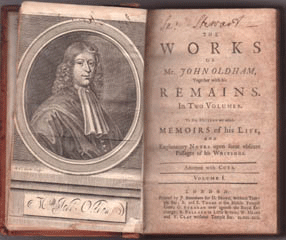
John Oldham, "Satyr Upon a Woman, Who by her Falshood and Scorn was the Death of my Friend" (1678)
1. Take 2 minutes and try to use as many of the following words as you can in a story or report.
free
cry,
perjury:
prove,
Love:
her
Executioner:
spite,
Wit.
her,
Murderer:
wou'd,
blood.
be,
I
aid
dead:
Infamy,
she,
hide,
abide:
cast,
blast,
fame
name,
mine,
line.
If all you knew were the final words of this section. what could you say about the poem?
2. Look for legal vocabulary in the poem, e.g., perjur'd, Judgment, Murd'ress, criminal, etc. What do these legal terms imply? Why is "law" important?
3.
Ye spightful pow'rs . . .
. . .
Assist with Malice, and your mighty aid
My sworn Revenge, and help me Rhime her dead (ll. 39-41).
Do you ever worry about death caused by a poem? What do you think about such powerful language? Who can use it? Look at the section that follows. What will the poet's power cause?
4. What is the basic charge against "woman" in lines 52-63? What are the woman's origins?
5. Bawd Nature taught her jilting, when she made
And by her make, design'd her for the trade (lines 64 ff.).
What is the "trade"? What are the charges against woman here? Can you connect the details of this section of the poem with Juvenal, Tertullian, or Jerome?
6. "Her conscience stretch'd, and open as the Stews" (l. 85): Work out the implication of this charge. Does it remind you of any other satiric vignette?
7. In lines 98-9, the poet says her guilt "description does out go." What does he mean? And what's beyond description?
8. What is the relation between a legal penalty and a curse?
9. Paraphrase some of the curses. What language strikes you as worth comment? What is the final curse?
10. What do you make of this poem?
Robert Gould, Love Given O're (1682)
1. free
Liberty
2. wrought,
thought;
3. adore
more
4. proclaim
Name
5. bear
despair
6. Breast,
rest,
7. woes
repose:
8. Wiles,
Smiles,
9. move,
Love
10. Mind,
Womankind
11. fair,
War;
12. read,
dead:
13. Vice,
intice,
14. Pride,
beside
15. Eye,
lie,
16. be
me
1. What would you guess about the poem from the rhyme words of the first 32 lines?
2. What do you make of such vocabulary as adore, kneel, pray?
3. Notice the political vocabulary: "(while others are lashing the Rebellious Times into Obedience)" [from address to the reader]; "regain'd my ancient Liberty" [1]; "usurp't the sway"; "Empire"; "rebel"; "Civil-War" [2]; "Rebelliously" [3].
4. Notice again (cf. Oldham poem) the relation of women, satire, and law: "the very Name's a Crime, / Enough to blast, and to debauch my Rhime." Women are "Averse to all the Laws of Man, and Heav'n" (2). Notice the vocabulary of "boundless" and "unbounded." (See also all the flooding imagery, e.g., p. 6).
Why is a wife worse than "a Wench . . . (full of lewd desires)" (2)? Where else have you heard the principle "That of the two Ills the least is to be chose"?
5. What happens to the creation story here? (See 2 & 3.) Compare Oldham. Where does the creation story recur in this poem?
6. Who is "Rome's Emperial Whore" (3-4)? What is she doing in this poem? And what is the relation between women's vice and the poet's verse?
7. In the "Bewley et al." portrait (4-5), what does the poet claim about the grave?
8. Can you fill in the blanks?
9. In what sense is the womb like the tomb?
10. What is the relation of women and modesty (6)?
11. What does the satiric adversary of this poem have to say? And what is the answer (7)?
12. Trace the major charges against women: lust, inconstancy, etc.
13. What's the Ephesian Matron doing here (9)?
14. What do you make of the "one universal Ruine" that women cause?
15. What is the gem that women rob men of?
Richard Ames, The Folly of Love (1691)
Just a thought: If this poem were your only evidence, how would you define satire?
1. What happens to the creation story in this poem? (See especially p. 2.) Who performs the rib operation? What is the occasion for the tasting of the forbidden fruit?
2. What idealizing elements does the poem begin with?
3. What do you make of the political language, e.g., Rebels, Non-Resistance, Prince, Abdicate?
4. What features of the poem do you recognize from other satires, e.g., the rara avis (p. 12), the "raw Country Girl" (p. 6)? Where have you seen them before?
5. Lord of himself, his passions not enslaved;
He nothing wanted, for he never craved.
Make a connection between these lines and Tertullian and Jerome. Where else in the poem is desire (wanting) important?
6. Look for language of worship, e., g. Reverence, Devotion, Goddess. How do you account for this language in this poem?
7. What is the result of Woman's producing children?
8. "torment and vex": These terms characterize women, but they are often used to characterize the satirist's aims. What connection do you see between woman and satirist in this particular poem?
9. What does women's "art" mean? (See, for example, pp. 4-5.)
10. Examine the Lady's Dressing Room scene (p. 7) very carefully. What elements of this scene have you seen before? What can you make of it?
11. Boundless lusts: Where have you seen this idea before?
12. "By arbitrary custom" (p. 9): How could these lines be turned into a feminist position?
13: Women with grooms and footmen: Compare with Juvenal.
14. Random reference to "wash a Negro white" (p. 11): What do you make of it?
15. The "Female Advocate" (p. 11): Has this poetic speaker listened to Sarah Fig[g]e?
16. "We lie like Fishes gasping on the shore" (p. 12): How might you relate this line to the writings of the Church Fathers?
17. What is the "Linnen-lifting trade" (p. 13)?
18. We have been talking about the "heroizing" effect of these satires against women (women are enlarged merely by virtue of making them extreme examples). Ames's satire might seem a bit different. Could you give evidence of the greater "corrosive" effect of this poem? (Would you choose a different word?)
19. Please pose questions of your own for p. 14 to the end? (And answer them, too, of course.)
20. What do you make of the world-without-women fantasy with which the poem ends? How does it connect with the beginning of the poem?
21. How might you compare this poem with the poems of Oldham and Gould?
1. To what extent do The Vagina Monologues encourage women to identify with/by their vaginas? Or, to what extent does it ask women to be proud that they are part of a "community of vaginas?" What implications do these methods of self-identification have and what are some possible problems?
2. What can men or people without vaginas learn from The Vagina Monologues?
3. What are the limitations of The Vagina Monologues as a tool for activism? How is "vagina" discourse problematic to ideas of gender? How is it beneficial? Do men and women learn different things from this book/performance?
4. Why do you think she personifies the vagina?
5. Why include such a vast array of stories in different genres? While it seems like this book attempts to bring women together, it also seems like women must acknowledge how different their experiences are in order to come together as a community.
6. In what ways does Vagina Monologues fall short of the total female experience?
What are the limitations to tying the female experience to the genitalia? To sexuality?
7. What are the ways, including rhetoric, that she reconstructs the female experience and viewpoint?
8. What has changed about the discussion about female sexuality since publication of the boook? (1998)
9. Does Monologue as a platform encourage discussion? or is it just a space for women to express themselves?
10. How does expression of sexuality fit into feminism?
Do men need to see it? why?
11. Why is talking about Vaginas such a taboo topic, even in the modern age?
12. Why is talking about natural bodily functions taboo as well?
